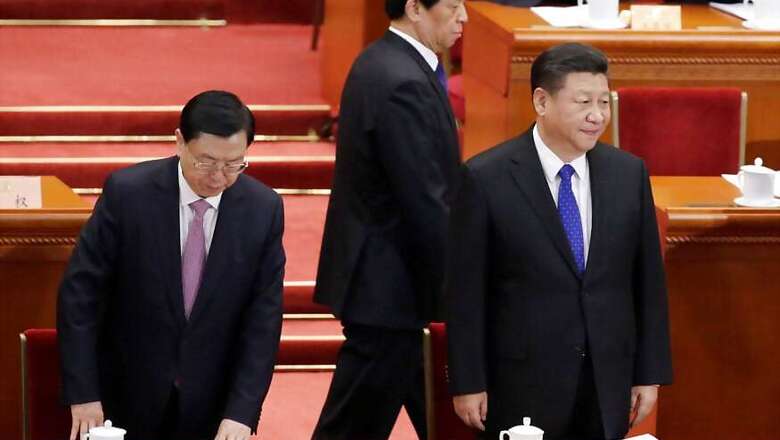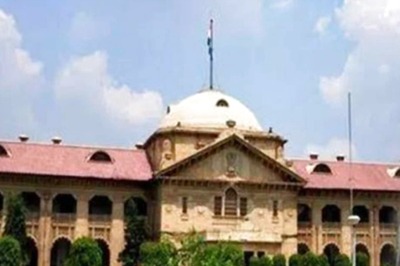
views
Beijing: China kicked off its annual full session of parliament on Monday, which will approve a slew of top appointments before the end of its two week-long meeting.
Delegates of the National People's Congress will elect the Chinese president, vice president, and chair of the State Central Military Commission on March 17.
They will confirm the nomination for the premier, as well as vice chairs of the State Central Military Commission on March 18. They will also elect the chair of the National Supervision Commission on the same day.
Delegates will confirm the nomination for the country's vice premiers, state councillors, ministers and new governor of the People's Bank of China on March 19.
Here are some names to watch for and their possible new positions, based on what people with direct knowledge of the situation, sources with ties to the leadership, and diplomats have told Reuters:
Wang Qishan. A close ally of President Xi Jinping and former top corruption-buster, Wang stepped down from the ruling Communist Party's seven-member Standing Committee, the apex of power in China, in October at the end of a party congress. Wang, 69, is expected to become vice president on March 17, with a specific role dealing with the Trump administration.
Li Zhanshu. One of Xi's closest allies, Li, is poised to be elected chairman of the National People's Congress, or parliament, on March 17. Li, 67, joined the Standing Committee during the 19th Party congress. He can only serve one five-year term unless the age limit for staying on or further promotion is eased.
Wang Yang. He is a shoo-in to become chairman of the Chinese People's Political Consultative Conference (CPPCC), the top advisory body to parliament. Wang, who turns 63 this month, is a liberal by Communist standards. He made it to the Standing Committee last October.
Zhao Leji. He is tipped to head the nascent National Supervisory Commission, which will be responsible for investigating corruption alongside the party's Central Commission for Discipline Inspection which he also heads. Zhao, who turns 61 this month, is the party's top dog against corruption and the youngest Standing Committee member.
Han Zheng. A newcomer to the Standing Committee, Han will almost certainly become the No. 1 vice premier. Aged 63, Han was mayor of China's financial capital, Shanghai, from 2003 to 2012, briefly the city's acting party boss and then the city's party boss from 2012 to 2017.
Liu He. Liu, already Xi's top economic adviser, is likely to succeed Ma Kai as vice-premier in charge of overseeing the economy and the financial sector. Liu, 66, is also the front-runner to replace Ma as head of the cabinet-level Financial Stability and Development Committee. Liu is also a candidate to succeed Zhou Xiaochuan as governor of the People's Bank of China.
Wang Chen. Wang, 67, who was instrumental in Xi's rise, is to become the No. 1 vice chairman of parliament. When Xi was Communist Party secretary of Zhejiang province from 2002 to 2007, Wang was sent to Zhejiang to conduct a background check on Xi and wrote a glowing internal report about Xi. Wang has regularly accompanied Xi on overseas trips in the past five years.
Wang Yi. The 64-year-old foreign minister could be promoted to State Councillor, which would make him the country's top diplomat as the position outranks the foreign minister. He may also keep his portfolio and be both foreign minister and state councillor.
Liu Qibao. The party's former propaganda minister was one of three members of the 18th Politburo who were passed over for further promotion to the Standing Committee after he voluntarily asked to be sidelined, allowing Xi to promote another of his men. As a consolation prize, he will be made the No. 1 vice-chairman of the CPPCC.
He Lifeng. Minister of state planning since last February, He, 63, is to become a vice chairman of the CPPCC to pave the way for him to stay on after reaching the compulsory retirement age of 65 for cabinet ministers. The former hydropower plant worker spent more than three decades in Fujian, overlapping with Xi.
Ma Kai. Ma, a vice-premier who helped oversee the economy and financial sector in the past five years, will retire this month and likely head the China Centre for International Economic Exchanges, a government think-tank, and continue to provide the government with economic and financial policy recommendations. Ma, 71, is seen as publicity shy and not as high-profile as Xi's top economic advisor Liu He, but trusted by Xi.
Wei Fenghe. The People's Liberation Army general could be China's next minister of defence and concurrently a state councillor. He was the last commander of the PLA's Second Artillery Corps before it was renamed Rocket Force as part of a sweeping restructuring of the military. Born in 1954, he became a member of the party's Central Military Commission last October.
Wang Xiaohong. Wang, 60, a vice minister of public security, will likely replace Chen Wenqing as minister of state security, a secretive body responsible for counter-intelligence, foreign intelligence and national security. Chen is set to become the country's top prosecutor.
Guo Shuqing. Guo, 61, who was appointed head of the banking regulator a year ago, is also a front-runner to become the next central bank chief. Guo was previously governor of the prosperous province of Shandong, head of China's forex regulator and chairman of the country's securities watchdog.
Liu Shiyu. Liu, 56, head of the securities regulator, is likely to become the chief of a new combined banking and insurance watchdog. Liu was previously the chairman of the Agricultural Bank of China.
Tian Guoli. Tian, 58, chairman of China Construction Bank, is likely to become the new head of the securities regulator.
Shen Haixiong. The 51-year-old has been named president of state broadcaster CCTV which is expected to merge with China National Radio and China Radio International during the annual session of parliament. Shen worked for state news agency Xinhua for 26 years, rising to vice president before becoming provincial propaganda chief of Guangdong in 2015. Shen is a native of Zhejiang, where Xi served as provincial party boss from 2002 to 2007.




















Comments
0 comment